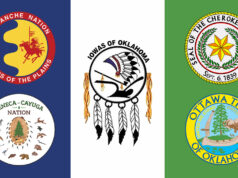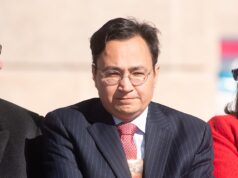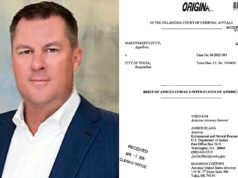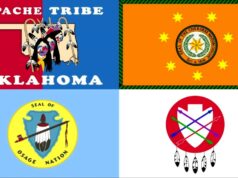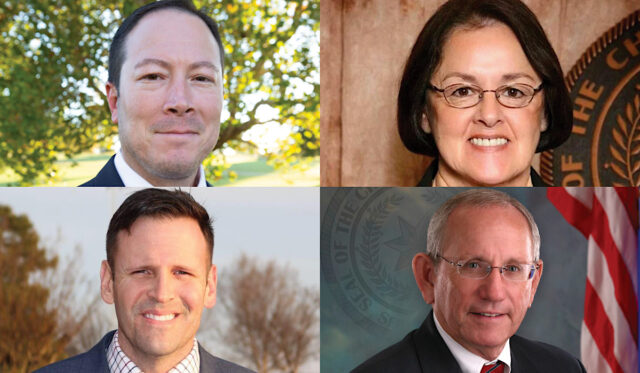
As Cherokee Nation citizens consider their principal chief options on Saturday, June 3, they will also cast separate votes for the deputy chief position. Four candidates are seeking the second-in-command office, and key topics in the race have included tribal sovereignty, Cherokee language learning and education.
Elected in 2019, Deputy Chief Bryan Warner is running for a second term. The three candidates running against him — Meredith Frailey, Bill Pearson and David Walkingstick — all have previous experience in public service.
Although candidates for Cherokee Nation principal chief and deputy chief sometimes run together as a unified ticket, citizens vote for each position separately.
Currently, incumbent Principal Chief Chuck Hoskin Jr. and Warner are running together, and Cara Cowan Watts and Walkingstick are also campaigning as a team. Frailey and Pearson are running their campaigns individually.
If Hoskin and Warner win reelection, they would be ineligible to run for principal chief and deputy chief again until 2031. The Cherokee Constitution prohibits more than two consecutive terms and requires consecutively elected officials to take a term off before running for office again.
The Cherokee Nation recently surpassed 450,000 enrolled tribal citizens. However, only 13,690 people voted in the 2019 deputy chief election. As of May 8, about 78,400 citizens are registered to vote in the Cherokee Nation.
In addition to the principal and deputy chief elections, eight positions on the 17-member Cherokee Nation Tribal Council are also up for election Saturday.
Cherokee citizens can vote early or drop off absentee ballots at the Election Commission office in Tahlequah between 7 a.m. and 7 p.m. through Thursday, June 1. On Saturday’s Election Day, precinct polling locations will be open between 7 a.m. and 7 p.m.
Candidates need to secure more than 50 percent to win Saturday’s general election outright and avoid a runoff. If necessary, runoff elections are scheduled to be held Saturday, July 8.
The following summary of the Cherokee Nation deputy chief race is drawn primarily from news reports, government documents, campaign websites and a debate among the four candidates hosted by the Cherokee Phoenix on April 25.
Bryan Warner touts ‘work alongside’ Chuck Hoskin Jr.
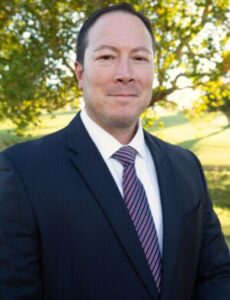
Deputy chief Bryan Warner was elected in June 2019 with 58.9 percent of the 13,690 votes cast by Cherokee Nation voters. Before his election, he served on the Tribal Council for four years representing District 6.
Warner has a bachelor’s degree in biology from Northeastern State University and a master of education degree from East Central University. He taught science courses at Carl Albert State College for eight years before being promoted to director of the college’s Sallisaw campus in 2017.
“It has been an honor to work alongside Principal Chief Chuck Hoskin, Jr.,” Warner said during the April 25 debate. “His administration has made many strides to make sure that our future will be rooted in Cherokee values, traditions and culture, but also be able to stand the test of time and what’s coming.”
If elected, Warner said his priority over the next four years would be the Cherokee people and “meeting them where they are.”
“Chief Hoskin and I will continue to protect our sovereignty and continue to perpetuate our language,” Warner said. “We will meet people. We will go out and take a look at how we can address our poverty, how we can address our needs, our gaps in health care, how we can look to education as our ancestors did.”
In March 2022, Hoskin and Warner proposed and saw approved a $120 million housing initiative to expand affordable housing options and offer low-income home repairs to Cherokee citizens across the reservation, which was functionally affirmed by the U.S. Supreme Court in the McGirt v. Oklahoma decision in July 2020.
Hoskin and Warner also proposed the Cherokee Family Protection and Violence Against Women Act, passed by the Tribal Council in September 2022, which expanded the Cherokee Nation’s criminal codes and provided additional assistance to victims of domestic violence.
Meredith Frailey focuses on tribal sovereignty
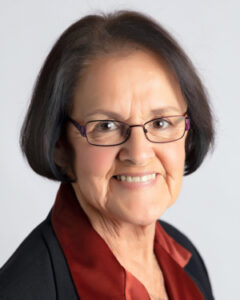
From 2003 to 2013, Meredith Frailey served on the Cherokee Nation Tribal Council representing District 6. When the revised Cherokee Constitution was implemented in 2006, Meredith Frailey was elected as the first speaker of the Tribal Council. (Chuck Hoskin Jr. was the first deputy speaker.)
Frailey currently serves as the city attorney for Locus Grove. In 2016, she was elected as the first female county commissioner of Mayes County, serving one term. She is a licensed airplane pilot and holds a bachelor’s degree from Northeastern State University and a law degree from the University of Tulsa.
“My overriding priority is sovereignty,” Frailey said. “Because our sovereignty is so fragile, I think it’s important that our leaders protect that so we’re not relegated to secondary status in Oklahoma.”
Frailey said the U.S. Supreme Court’s ruling in McGirt v. Oklahoma presents important opportunities for the Cherokee Nation.
“Since our reservation status has been reaffirmed, we’ve gained more leverage in negotiating with state and local governments,” Frailey said during the April 25 debate. “In my opinion, we should demand the federal government affirm our authority to tax and regulate commerce on our reservation and eliminate the inequity of dual taxation.”
Bill Pearson interested in improving education
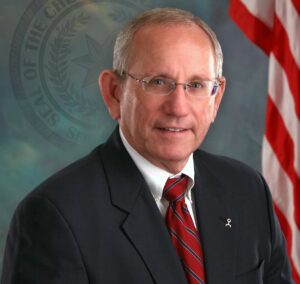
Bill Pearson is a U.S. Navy veteran and the chairman of the Rogers County Republican Party. He serves on the Oologah Town Board and holds a master of business administration degree.
“Because of my partisan politics involvement, I understand the State Capitol,” Pearson said during the April 25 debate. “I think I would be an asset in working with the chief and working with the State Capitol in trying to resolve some of those issues that we face today.”
During the debate, Pearson called the Cherokee Nation government an “oligarchy” and said that “crony capitalism” has taken over Cherokee Nation Businesses, a tribally owned holding company with more than 9,000 employees. CNB operates about four dozen companies across three “business units” — hospitality, cultural and economic development, and federal contracting.
“I’ve looked at community buildings that are very, very elaborate, and across the street an individual’s plumbing doesn’t work,” Pearson said. “Another individual’s roof leaks. Another individual can’t get their prescriptions filled. I think it’s time for us to reevaluate and go to the communities and really understand what the quality of life means to our rural communities.”
If elected, Pearson said he would focus on improving education outcomes. He said he wants to look into adopting a reward system for high-performing schools within the Cherokee Nation. He also said he wants to perform a forensic audit on the Cherokee Nation and evaluate the tribe’s policies and procedures.
“In the last 12 years, we’ve become a very partisan organization,” Pearson said. “I think that we need to return to the days when we were a nonpartisan group. Take care of Cherokee business, take care of Cherokee elections and not worry about what’s going on in the rest of the country or what’s going on in the state of Oklahoma.”
David Walkingstick concerned about Cherokee language programs
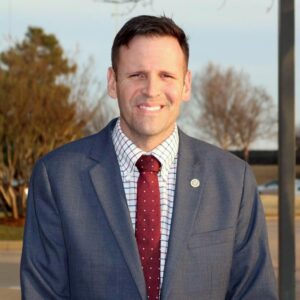
From 2011 to 2019, David Walkingstick represented District 3 on the Cherokee Nation Tribal Council. He holds a bachelor’s degree from the University of Central Oklahoma and a master of education degree from East Central University.
Walkingstick was a youth pastor while in college and spent the majority of his career working in public schools. In 2014, former Oklahoma Gov. Mary Fallin appointed Walkingstick to serve on the Oklahoma Advisory Council on Indian Education. (Current Gov. Kevin Stitt, a Cherokee Nation citizen who has clashed with tribal nations, recently vetoed an extension of the state council, but the Oklahoma Legislature overrode him and passed the bill into law.)
During the April 25 debate, Walkingstick said funding for Cherokee language learning should be funneled into communities as opposed to the recently opened $20 million Durbin Feeling Language Center in Tahlequah.
Walkingstick claimed there is “segregation” in the Cherokee Nation’s Speaker Services Program and the Cherokee Language Master Apprenticeship Program. The Speaker Services Program reaches out and provides various resources to citizens who speak fluent Cherokee. The Master Apprenticeship Program is an adult immersion program designed to create new Cherokee language teachers.
“There’s a lot of people that understand Cherokee that can’t speak that grew up in Cherokee-speaking families that can’t get those services,” he said. “In the Master Apprenticeship Program, we have full bloods and traditional people that actually use the language. They’re being denied to be in that program.”
If elected, principal chief candidate Cara Cowan Watts and David Walkingstick have vowed to transform the principal chief’s mansion into a domestic abuse shelter.
On April 24, five Cherokee citizens sued Watts and Walkingstick, accusing them of breaking privacy laws by providing tribal voters’ information on their campaign website.
According to the lawsuit, the database was a “registration checker” and provided the names and addresses of every Cherokee citizen. A Cherokee Nation District Court judge issued an order mandating Watts and Walkingstick remove the “registration checker” from their website and do whatever necessary to “eliminate internet access to the private information of Cherokee citizens in their possession.”
In a court filing, Walkingstick defended his and Watts’ website by criticizing those who had filed the lawsuit against them.
“Plaintiffs abuse of the judicial system to give media credibility for them throwing unsupported political ‘red meat’ to the press, shows the lack of credulity of their claims for irreparable harm, and completely fails to serve as any proof of any of their allegations,” Walkingstick wrote.
David Walkingstick disqualified in prior election
The April lawsuit regarding the “registration checker” was not the first time Walkingstick has faced an allegation of electoral misconduct.
In 2019, Walkingstick and Meredith Frailey ran for principal chief and deputy chief against Hoskin and Warner. However, Walkingstick was disqualified owing to alleged campaign violations only 15 days before the election.
According to the Cherokee Nation Election Commission, Walkingstick illegally solicited campaign contributions and accepted illegal in-kind contributions from a group called Cherokees for Change LLC.
A political professional named Rusty Appleton had initially been Walkingstick’s designated financial agent for his 2019 campaign, but seven days prior to Appleton leaving Walkingstick’s operation, he formed Cherokees for Change LLC, which then actively campaigned for Walkingstick and against Hoskin through videos, a Facebook page, a website and a pair of mass mailings.
Walkingstick said he was not involved with Cherokees for Change and appealed the Election Commission’s decision to the Cherokee Nation Supreme Court. The court upheld the decision and concluded that Walkingstick “knew Appleton had created Cherokees for Change to solicit and receive contributions in support of his candidacy,” and he and Appleton “engaged in solicitation of unlawful campaign contributions.”
Section 43, Item A of the Cherokee Nation Election Code only allows contributions to campaigns made by individuals. No business or organization of any kind may contribute to Cherokee Nation campaigns or candidates.
“In 2019, you, the Cherokee people, asked me to run for chief of the Cherokee Nation,” Walkingstick said during this year’s April 25 debate. “Your voice was stolen after I was kicked off (…) prior to the election. This campaign that Cara Cowan Watts and I are running is to make sure that you, the Cherokee people, have a voice, that employees have a voice and that our Cherokee elders and our Cherokee youth will have a tomorrow and a future.”
The results of the June 3 general election are expected to be posted on the Cherokee Nation Election Commission’s website.












